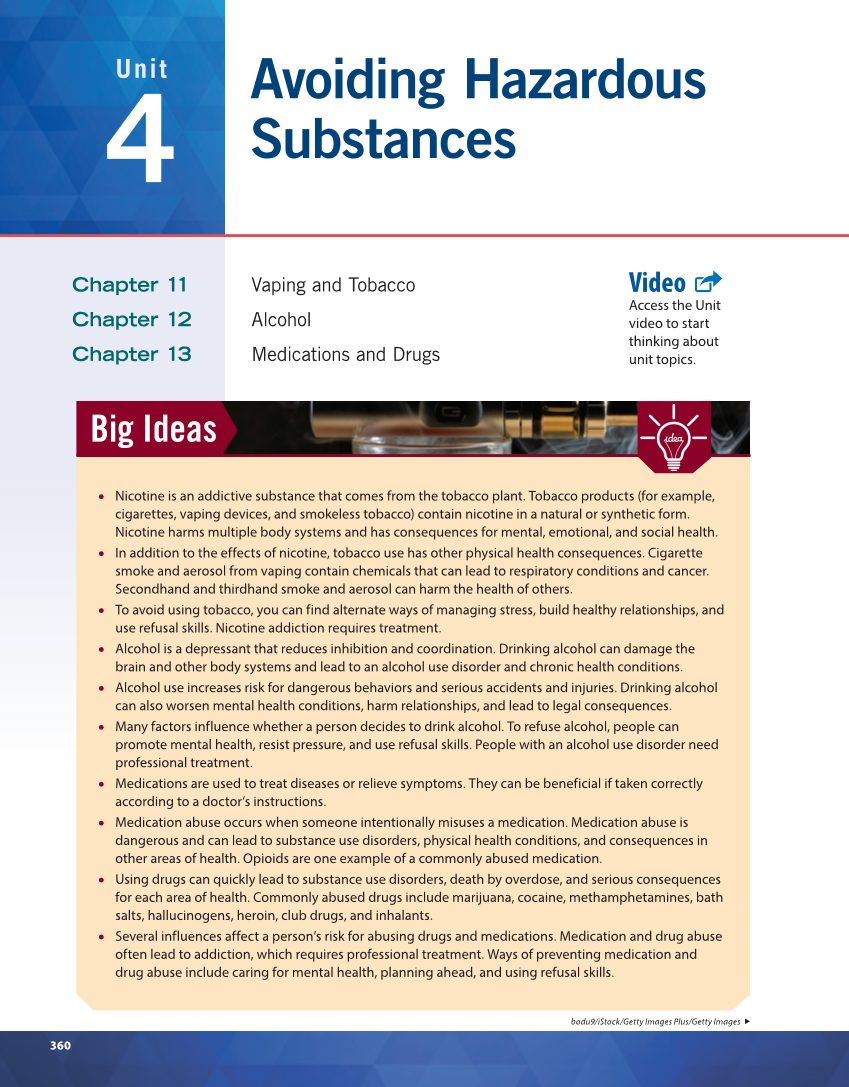Chapter 11 Vaping and Tobacco Chapter 12 Alcohol Chapter 13 Medications and Drugs Unit 4 Avoiding Hazardous Substances Big Ideas ● ● Nicotine is an addictive substance that comes from the tobacco plant. Tobacco products (for example, cigarettes, vaping devices, and smokeless tobacco) contain nicotine in a natural or synthetic form. Nicotine harms multiple body systems and has consequences for mental, emotional, and social health. ● ● In addition to the effects of nicotine, tobacco use has other physical health consequences. Cigarette smoke and aerosol from vaping contain chemicals that can lead to respiratory conditions and cancer. Secondhand and thirdhand smoke and aerosol can harm the health of others. ● ● To avoid using tobacco, you can find alternate ways of managing stress, build healthy relationships, and use refusal skills. Nicotine addiction requires treatment. ● ● Alcohol is a depressant that reduces inhibition and coordination. Drinking alcohol can damage the brain and other body systems and lead to an alcohol use disorder and chronic health conditions. ● ● Alcohol use increases risk for dangerous behaviors and serious accidents and injuries. Drinking alcohol can also worsen mental health conditions, harm relationships, and lead to legal consequences. ● ● Many factors influence whether a person decides to drink alcohol. To refuse alcohol, people can promote mental health, resist pressure, and use refusal skills. People with an alcohol use disorder need professional treatment. ● ● Medications are used to treat diseases or relieve symptoms. They can be beneficial if taken correctly according to a doctor’s instructions. ● ● Medication abuse occurs when someone intentionally misuses a medication. Medication abuse is dangerous and can lead to substance use disorders, physical health conditions, and consequences in other areas of health. Opioids are one example of a commonly abused medication. ● ● Using drugs can quickly lead to substance use disorders, death by overdose, and serious consequences for each area of health. Commonly abused drugs include marijuana, cocaine, methamphetamines, bath salts, hallucinogens, heroin, club drugs, and inhalants. ● ● Several influences affect a person’s risk for abusing drugs and medications. Medication and drug abuse often lead to addiction, which requires professional treatment. Ways of preventing medication and drug abuse include caring for mental health, planning ahead, and using refusal skills. bodu9/iStock/Getty Images Plus/Getty Images 360 Video Access the Unit video to start thinking about unit topics.
